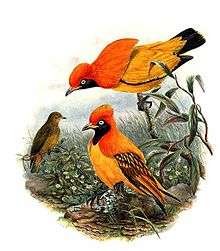Flame bowerbird
| Flame bowerbird | |
|---|---|
 | |
| Males displaying to a female masked bowerbird, Sericulus aureus aureus, illustrated by John Gould (1804-1881) | |
| Scientific classification | |
| Kingdom: | Animalia |
| Phylum: | Chordata |
| Class: | Aves |
| Order: | Passeriformes |
| Family: | Ptilonorhynchidae |
| Genus: | Sericulus |
| Species: | S. aureus |
| Binomial name | |
| Sericulus aureus (Linnaeus, 1758) | |
The flame bowerbird (Sericulus aureus) is one of the most brilliantly coloured bowerbirds. The male is a medium-sized bird, up to 25 cm long, with flame orange and golden yellow plumage, elongated neck plumes and yellow-tipped black tail. It builds an "avenue-type" bower with two side walls of sticks. The female is an olive brown bird with yellow or golden below.
The flame bowerbird is distributed in and endemic to rainforests of New Guinea. This species is the first bowerbird described by naturalists. Because of the male's beautifully coloured plumage, it was previously thought to be a bird-of-paradise. Indeed, the male flame bowerbird also has a courtship display along with his bower. He twists his tails and his wings to the side, and then shakes his head quickly.
The courtship behaviour of the flame bowerbird was filmed by Japanese photographer Tadashi Shimada in Dancers on Fire, a documentary that aired on the Smithsonian Channel. Although the male appeared to court females twice, no successful mating was filmed as the female moved away when the male mounted. However, Shimada filmed other peculiar behaviour, such as a male courting a juvenile male and several juvenile males as well as an adult male appearing to share one bower, only to be destroyed by another juvenile male.
Subspecies
There are two distinct subspecies, sometimes considered full species:
- Sericulus aureus ardens (flame bowerbird), from south-western New Guinea, with orange-faced male
- Sericulus aureus aureus (masked bowerbird), the nominate form of north-western New Guinea, with black-faced and black-throated male
The flame bowerbird is evaluated as least concern on the IUCN Red List of Threatened Species.
References
- ↑ BirdLife International (2012). "Sericulus aureus". IUCN Red List of Threatened Species. Version 2013.2. International Union for Conservation of Nature. Retrieved 26 November 2013.
